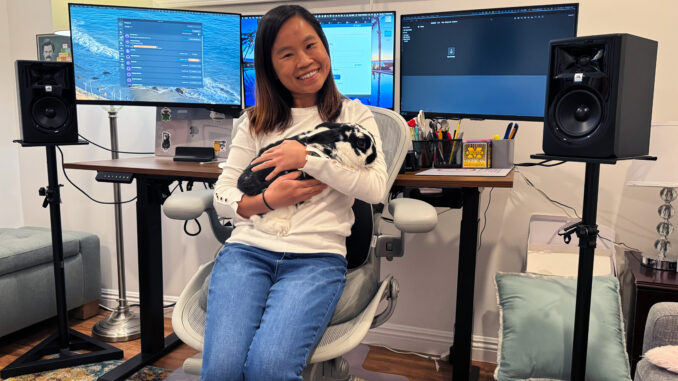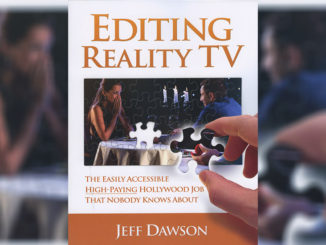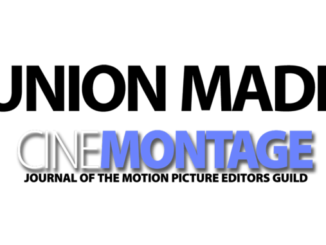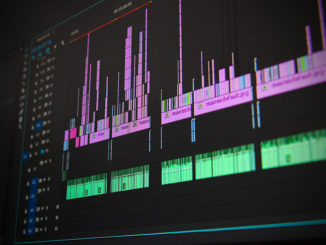
Where are you currently employed?
I’m currently unemployed, but I’m hopeful that the industry picks up soon so we can all get back to work.
Current projects?
The strikes have slowed work a lot, but the most recent projects include “The Resident,” “History of the World: Part II” (both on Hulu), and “A Black Lady Sketch Show” (on Max, the Streamer Formerly Known as HBO).
Describe your job.
I am an assistant editor who hopes to become a full editor one day. My job includes organizing footage, doing script sync where I mark every time an actor says a line, creating temp visual effects, and doing temp sound design. I also cut recaps (“Last week on ________,”) and I even get the privilege of cutting scenes whenever I get the chance.
How did you first become interested in this line of work?
I went to the University of Michigan to study film and stumbled into my interest in post-production through a student group, M-agination, that I joined my freshman year. I was able to see other students shoot, produce, and edit their films and was inspired to do the same for mine. I took a stronger interest in editing my student films. During the last few years of college, I also worked in the film equipment department where I assisted with filming and editing promotional videos for our department.
Who gave you your first break?
One of my closest college friends is a fellow union editor, Anna Terebelo, who recommended me to assist on my first non-union assistant editor job, called “Hollywood Darlings.” It was a great introduction to becoming an assistant editor. Not only did I learn about the workflow of scripted television, but I also had the freedom to cut comedy reels for the director and cut scenes for the editors.
What was your first union job?
It was for a TV Land show called “Teachers.” I assisted Maura Corey, an editor who taught me a lot about what it looks like to be a good assistant. She also gave me many lessons in doing temp sound design, temp visual effects, doing temp music edits, and teaching me proper room etiquette with producers. Those are skillsets that I continue to use in my everyday professional life. Anyone who gets to work with Maura is extremely lucky!
What credits or projects are you proudest of, and why?
There are many credits that I am proud of, including “Briarpatch,” “History of the World: Part II,” and “A Black Lady Sketch Show,” among others.
“Briarpatch,” produced by Esmail Corp, was the first show that really put me on the map as an assistant who could work on shows other than comedies. It was a great opportunity to get experience on a drama. Gina Hirsch was a fantastic editor and a mentor to me on that show, and beyond.
“History of the World: Part II” … Getting to be part of a Mel Brooks show was a dream come true! Amazingly, even though this was the first time I had worked with anyone on this team, it felt like I had known everyone forever. The editors — Stephanie Filo, George Mandl, Daniel Flesher, Angel Gamboa Bryant, and Daniel Missirlian — and fellow assistant editor Kenneth Rich and I all had the utmost respect for each other’s work, which made for funnier, more genuine content.
I feel privileged to have been a part of “A Black Lady Sketch Show.” This was another sketch-comedy show where everyone shared the goal to make it as funny as possible. The production was extremely fast-paced, so we had to rely on each other to keep things organized. I’m grateful that Stephanie Filo invited me to work on the show with her. She and the editors truly valued what the assistants thought. I also built a great dynamic with fellow assistant editor Liz Pozzi (Berganza). Our strong connection and communication skills were imperative for navigating numerous obstacles that came with working from home.
For instance, because we were working on all episodes, we needed to stay consistent on how exports looked, how tracking sheets were organized, etc. We were very thankful that our co-producer had already custom-formatted a lot of the Google Drive docs for what our show needed. There were also a lot of moving parts — sketches were being moved around between episodes; the editors were constantly consulting with the director and producers – so decisions were made quickly. The AEs were responsible for staying current with information along with keeping up on exports of the latest sketches for producers.
What was your biggest challenge in your job (or on a particular project) and how did you overcome/solve it?
The switch to working completely remote at the end of 2020 proved to be one of the biggest challenges in my career so far. I was on a show called “Black Lightning” that originally aired on The CW and later streamed on Netflix. My editor, Arman Tahmizyan, and I were used to working in an office together and being able to go back and forth between our offices to get things done. When the pandemic hit and we suddenly went back to work after a few months off, getting used to a totally new workflow with all the COVID restrictions made things difficult. There was a lot of trial and error of adjusting to a fully remote workflow that had a lot of technical difficulties. We eventually got the hang of it with a lot of communication!
What was the most fun you’ve had at work?
That was probably when I worked on “Briarpatch.” It was the last show I worked on in an office before the pandemic. Of course, there had been challenges to working in the office, and the commute to Culver City was not the best, but that post-team community had been a positive experience for me. I met some of my best friends (and my life partner) while working there. After COVID hit, I really came to miss that aspect having an office life.
Jobwise, what do you hope to be doing five years from now?
I hope I’ll be cutting a show that is culturally impactful and meaningful to people. Whatever it may be, I hope that I’ll be making a difference in people’s lives, including my own.
What are your outside activities, hobbies, passions?
Outside of work, I spend a lot of time taking care of my two pets – my dog, Essie, and my rabbit, Teddy. In addition to loving animals, I cook and bake a lot at home! I also enjoy hanging out with friends, taking walks… and napping.
Favorite movie(s)? Why?
“Soul,” “Inside Out,” “Eternal Sunshine of the Spotless Mind,” “The Holdovers,” and “Everything Everywhere All At Once.”
I have a variety of favorites, depending on my mood. I love these movies because they have relatable and grounded themes that speak to me.
Favorite TV program(s)? Why?
“Ted Lasso,” Abbott Elementary,” “Lessons in Chemistry,” “Severance,” “Schitt’s Creek,” “Bob’s Burgers,” “The Office,” and “Parks and Recreation.”
I’m a huge fan of TV comedy shows, especially those that help me get through difficult times. “Severance” is in a different genre from the rest of the shows; it’s a workplace drama, done in such a unique way. I applaud its jumping editing style where we are constantly taken into the two different worlds – the “innie” world at work and the “outie” world outside of work. I also really like the music cue in the finale that they constantly use as transition between the different characters. The way this show makes an audience feel something familiar yet dystopian is something that is lifechanging for me and a reason that I would love to work on a show like that.
Do you have an industry mentor?
There are so many industry mentors in my life and I’m grateful to all of them. The first mentor of mine is Stephanie Filo, ACE, who really helped me both on “History of the World” and “A Black Lady Sketch Show.” The more I worked with her, the more I realized it’s possible to make a difference in post-production. She really encouraged me to cut as much as possible and saw the assistants as creative collaborators — which is rare among editors. I’m in constant awe of her success, winning four Emmys among many other awards. She does all of this while also staying extremely kind and humble to everyone she works with. Thank you, Steph, for setting such a high standard in this industry.
Another mentor of mine is George Mandl, ACE. He was the one who took a chance on a completely new hire when we started on “History of the World: Part II.” Even though we never worked together before that show, it felt like we had worked together forever. He asked me what my dreams and aspirations are for this industry (to edit, of course), and he has promised to help me achieve those dreams. Thanks, George for being a great teammate and always pushing me to do my best.
One final mentor I’d like to mention is Timothy Good, ACE. While I’ve haven’t assisted him so far in my career, I’ve really looked to him as a career mentor since I started as a post PA. He was an editor on my first scripted show, “Midnight Texas” for NBC, and has always given me great career and life advice. He is one of the most knowledgeable editors/producers/directors I’ve ever met. Not to mention, he is also one of the most authentic people I know. I’ve loved staying in touch with him over the years, attending his seminars, and learning how to succeed with grace. Truly, there are not enough kind words I can say about him.
What advice would you offer to someone interested in pursuing your line of work?
For the assistant editor job specifically, I would say to keep up your temp sound design and temp visual effects skillsets. The rest of the job is technical, but having those creative skillsets perfected will set you apart from others. Also, take initiative to be a problem solver for both the editor and the rest of the post team. Be present for your entire team.
For people pursuing a job in this industry in general, I would tell them to network and continue to build connections even in the most unlikely situations. Keeping in touch with people, especially in casual settings, is a great way to build authentic connections. This industry moves fast, and no one knows who will be where on the next job. Be humble and always remember the teams that provide support. Give credit to teammates when credit is due, and things will always come around full circle.
Was there ever a circumstance when you had to rely on the Guild for help or assistance?
Yes, I’ve had to rely on the Guild a lot, especially with the pandemic and then the strikes this past year. For instance, I recently had to rely on them for extending healthcare coverage and delaying dues payments.
Is there anything you’d like to say to your fellow Guild members, some words of encouragement?
These past few years have been hard on all of us, but the people in this industry give me hope that things will get better. No one can do this career alone, and we all need each other to lean on and to move forward. One of many reasons I am so proud to be a member of Local 700 is the network of people I’ve met over the years. There will always be ups and downs in this career, but the people we choose to build us up will make it all the better.





